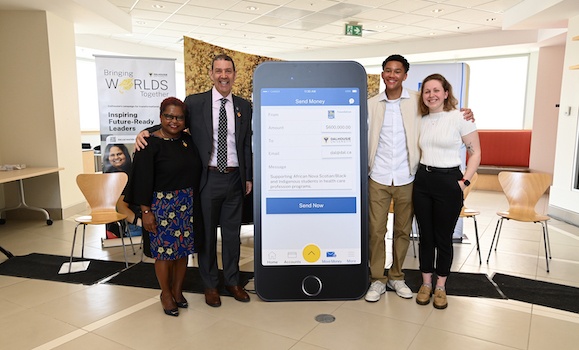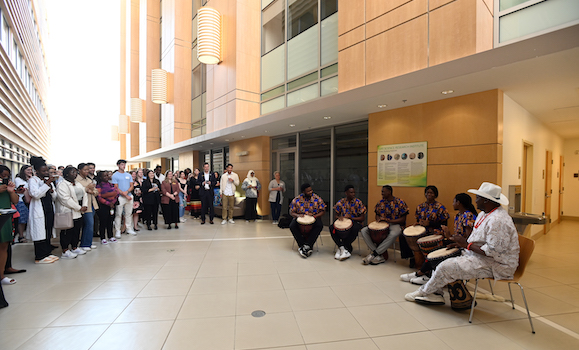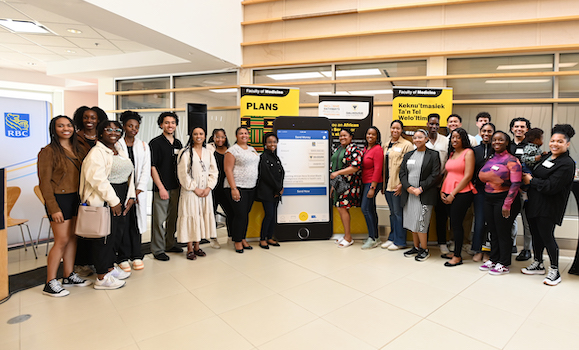News
» Go to news mainRBC and Dalhousie partner to transform health‑care education

RBC Foundation announced a game-changing $600,000 gift to Dalhousie University to bolster initiatives that foster inclusivity within the health professions.
The three-year commitment, announced Thursday (May 16) intends to improve the participation of African Nova Scotian/Black (ANS/Black), and Indigenous students at Dalhousie by building on the university’s existing programs.
The funding will support the Inclusive Pathways to Medical Professions (IPMP), Promoting Leadership in Health for African Nova Scotians (PLANS), and Keknu’tmasiek Ta’n Tel Welo’ltimk (KW) initiatives, which are designed to increase representation and participation of historically marginalized groups in health-care education at Dalhousie.
These initiatives will support more than 800 students, marking a significant step forward in the pursuit of inclusive and accessible health education.

Breaking barriers in health care
In Atlantic Canada and the rest of the country, waitlists to access health care are long, but particularly acute for underserved populations. The lack of representation amongst health-care professionals amplifies inequalities and access to care, especially for ANS/Black and Indigenous communities.
“Access to outstanding health care is a priority for RBC, just as it is for all Canadians,” says Chris Ronald, regional president, Atlantic Canada, RBC.
“We also recognize that Canada’s workforce is rapidly changing, and that it is important to ensure everyone has access to the skills and training they need to succeed. We are delighted to support Dalhousie in meeting these goals through programs that are bringing more African Nova Scotian, Black, and Indigenous students into health profession programs.”
A broader purpose
Although improving representation amongst health-care professionals and in programs is critical, Dalhousie believes robust support structures that ensure student success and retention must also accompany recruitment efforts.
Dalhousie's IPMP, PLANS, and KW initiatives provide culturally relevant support services to students. With RBC Foundation's support, Dalhousie will expand these wraparound services to include counselling, mentorship, tutoring, career development, safe spaces, community building, admissions support, and Elder-in-Residence programs. These initiatives will empower students throughout their educational journey and prepare them for successful careers in health care.
Dr. Barb Hamilton-Hinch, associate professor and assistant vice-provost equity and inclusion at Dalhousie, expressed gratitude for RBC Foundation's support, highlighting the critical role wraparound supports will have in ensuring students’ success.
"Dalhousie has strong, proactive programs to drive the engagement and recruitment of ANS/Black and Indigenous students into health profession programs,” says Dr. Hamilton-Hinch.
“However, once students have enrolled in these programs, they need supports and services that help them succeed. We are grateful to RBC Foundation for supporting us in our commitment to helping our students excel."
Dr. Hamilton-Hinch also highlighted the broader impact of RBC Foundation's contribution — the role it will play in fostering a more equitable model of health-care delivery. By championing diversity and providing resources to aspiring health-care professionals from diverse backgrounds, Dalhousie and RBC Foundation are working together to reduce health-care disparities and meet the unique needs of Atlantic communities.

Impact in action
Kalei Crowell is a second-year Mi’kmaw student at Dalhousie Medical School and a volunteer with the KW program, where she supports other Indigenous med students in sharing circles, community building, and creating safe spaces.
“This funding from RBC Foundation is going to help us connect and grow as a community,” says Crowell. “Increasing diversity in the med program is important, but this support also diversifies what KW can offer to current and incoming students, which is super exciting.”
Crowell goes on to say how supported she has felt by KW through the first two years of her medical education and hopes future Indigenous students will also reap the benefits of the program.
“Representation is very, very important in medicine,” Crowell says — not just in education, but having more Indigenous physicians in the region is something she believes would be incredibly powerful for patients looking for a feeling of safety and comfort.
“When a patient sees somebody that has sweetgrass on their computer, or is wearing a pronoun badge, those little pieces can let you know that’s a safe person to talk to, which in health care, when we're seeing people at their worst days, can be a big deal.”
As Dalhousie University and RBC Foundation forge ahead in their collaborative efforts, they have set the stage for an important shift in the health-care landscape, celebrating diversity and dismantling barriers to create a more inclusive and equitable future for all.
Recent News
- Dalhousie and NCIME launch first‑of‑its‑kind program in Membertou First Nation
- A message from Wanda M. Costen, PhD, Provost and Vice President Academic
- Rhodes scholar Sierra Sparks returns home to study medicine
- President Kim Brooks, Dr. Pat Croskerry appointed to Order of Canada
- Dal’s Highly Cited Researchers reflect on influential global research alliances
- A New Bursary Supporting Black Medical Students at Dalhousie
- Dalhousie’s first physician assistant cohort steps into Nova Scotia’s healthcare system
- Dalhousie med students explore pediatric care in Austria
